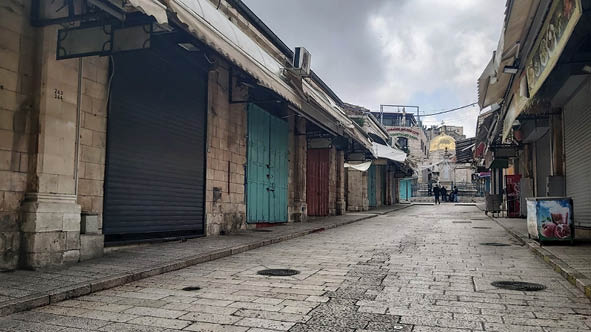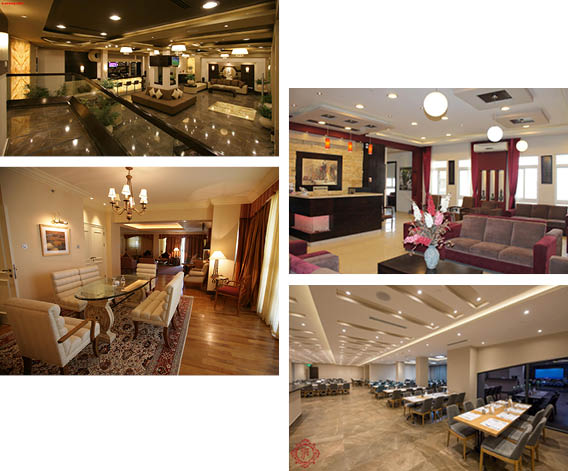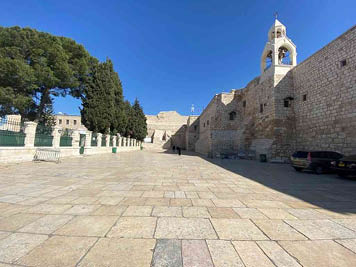Tourism is essential to the survival of the Palestinian economy. Depending on its religious, natural, and historical sites, tourism to Palestine reached 816,457 people in 2019, an increase of 31.4 percent from the previous year. Tourism activities contribute more than US$1.5 billion to the Palestinian economy. For every direct job in the tourism sector, two other indirect jobs are created in other sectors. But with the COVID-19 pandemic, international tourism has effectively come to an abrupt halt. In mid-July, Palestine was faced with uncertainty over an ongoing significant increase in new cases – at a time when many places in the world had begun the conversation around opening their doors to international tourists.
Michel Farwaji, head of human resources and general management at Gloria Hotel in Jerusalem, believes that as authorities continue to grapple with controlling the virus, it’s not possible to expect a quick resumption of work to pre-COVID-19 levels. He notes that there is a “consensus” in the tourism sector that it will take another nine to twelve months before Palestine starts to see tourism return to pre-coronavirus levels.

Some countries have begun to encourage internal tourism in a bid to try to make up for losses incurred due to closed borders and a general reluctance to travel. Tel Aviv Municipality and the Tel Aviv Hotel Association are urging Israelis to travel locally in an effort to boost a sector that usually is buzzing at this time of year. Benefits offered to hotel guests in Tel Aviv include sightseeing tours, discounts on entry fees, and free bike rides. According to Jimmy Zohar, the head of the Tel Aviv Hotel Association, “Hundreds of thousands of Israelis choose to vacation in the city every year and stay at hotels.” Whether these same Israelis feel safe now or are in a financial situation that allows them to take this type of vacation in the midst of the pandemic is yet to be seen. Ihab Jabari, from the Holy Land Incoming Tour Operators Association (HLITOA), believes that it is impossible for domestic tourism to compensate for the new reality and cautions that in Palestine, “our hotels, especially in the Bethlehem area, do not cater to the domestic market, and changing the approach to target this market needs major assistance from the government.”
“As Palestinians, we are used to turmoil, such as the war on Lebanon or the attacks on Gaza, when we lose the market for few months. But it has never stopped completely. So, we were not prepared at all to cope with such a situation.”
Ihab Jabari, Holy Land Incoming Tour Operators Association
Interestingly, while Israel continues to shut its doors to the rest of the world, the rest of the world – including, for example, Greece and Austria – has begun to open up its doors to Israelis. Americans are the nationality that brings the most revenue to Israel and Palestine through tourism. To acknowledge their current losses, the Israeli tourism ministry’s travel website features in the background an American flag and the words “To our friends in the US, stay safe, we look forward to welcoming you back soon. Shalom!” But America’s dire handling of the coronavirus will have direct implications for the Israeli travel sector, as Israel (and Palestine) will have to think long and hard before allowing the worst-affected country back into its densely populated cities.
Greece shares numerous aspects with Palestine. Tourism accounts for more than 20 percent of Greece’s GDP, an industry that in 2019 generated over €19 billion. Due to an early and strict lockdown, Greece finds itself with relatively few cases (3,000 confirmed cases and fewer than 200 deaths). Desperate to revive the vital tourism sector yet fearing that easing restrictions will result in a spike in new cases, Greece now promotes itself as a safe-choice holiday destination, running a campaign titled “Destination Greece: Health First.” A statement by the Ministry of Foreign Affairs cautiously announces that it will allow tourists from some nations to visit in the late summer season, while restricting travel from nations with high levels of infection. Scenes from recently reopened bars show, however, that social distancing rules are largely being ignored, prompting Andreas Andreadis, the chief executive of the Sani Ikos group of resorts, one of the largest in Greece, to call it “a game of trust.” Britain and the United States have confirmed that people cannot be trusted to practice social distancing when lockdowns are eased.

Safety measures applied in Greece include drones that warn people on beaches to keep a distance and rules for hotels, issued by the tourism ministry, that include a 17-page action plan: Doctors on standby, reception desks moved outside, food buffets served under “sneeze guards,” and rooms to remain vacant for several hours in between guests. Authorities have urged hotels to remove anything that could spread the virus (all nonessential decorative items, such as magazines and cushions). Restaurants, pools, and beaches will have to follow a similar set of instructions. When asked about what his hotel would do to ensure guests’ safety, Michel confirmed that they would follow health ministry guidelines meticulously: “Our staff will wear masks, protective glass shields will be installed where necessary, and cleaning measures will be ramped up, including frequent cleaning of public areas, regular disinfection of elevator buttons and doorknobs, and more.”
Similar to the situation in Israel, the Greek government is engaging in initiatives to encourage local tourism. But even if Greeks travel internally, they seem to prefer to stay with relatives for economic reasons. In Palestine, where poverty is around 29.2 percent, it is similarly hard to imagine that people would spend their money on hotels, even if they travel. Alex Jones, the administrative vice president of the Palestinian and Israeli travel company Green Olive Tours, stated that most locals travel alone or with friends and family rather than on paid tours like theirs. The hotel owners I spoke to agreed that for cultural and economic reasons, Palestinians are more likely to stay with family and relatives rather than pay for a hotel. And while Greece or Israel may have the resources to implement measures such as having a doctor present in every hotel, for example, in Palestine this is simply not possible.
“The Palestinian Tourism Ministry and the private sector, mainly the Holy Land Incoming Tour Operators Association and Arab Hotel Association, are creating, with the help of the German development agency GIZ, an outline of international standards for receiving tourists in Palestine. These standards are clear and detail the responsibilities that will help ensure the safety of both locals and tourists.”
Ihab Jabari, HLITOA
Many are calling for efforts to embrace a more sustainable way of living post-coronavirus, rather than a return to normal. Turkey is attempting to change our perception of tourism in this direction. Ali Can Aksu, the head of the Turkish Hotel Managers Association, stressed that having lost US$30 billion, Turkey must change the system in line with ecological values and nature. He pointed out that the fact that a billion-dollar industry could go bankrupt within a few months attests to its lack of sustainability, pointing out that the industry has focused on consumption and long neglected local tastes, organic products, and the environment. The story seems similar in Palestine, where the catastrophic economic effect of the current absence of tourists has forced many experienced tour operators to shut down.
There are interesting implications to this argument. If there is a new focus on locality and “village tourism,” a cultural shift regarding what we value when we go on holiday, perhaps countries such as Turkey, Palestine, and indeed many places around the Middle East and Europe can rely more on natural phenomena, local hospitality, and a more low-key, genuine experience that would not only be more sustainable but reveal new markets for the economy. Turkey has had at least 1,370,000 cases, and as in Palestine, its people are cautious and would prefer to wait a little longer for everything to be safer.

Jordan’s tourism has “skyrocketed” in recent years, and now, an economic crisis may ensue. Lockdown has resulted in losses of around US$500 million a month. Jordan is now pushing hard to encourage domestic tourism, advertising the “Safe Travels Stamp” it was awarded recently by the World Travel and Tourism Council. More importantly, the tourism ministry is hoping to welcome back international tourists soon. In Jordan, as in many other countries in the region that are so heavily reliant on tourism, the idea of the government being forced to take out unpopular but potentially essential loans from the IMF is becoming a more probable reality.
“The cooperation between nature and humans against this pandemic is an opportunity to go back to life as it was. The sea exists and will not dry up, the sand covers the beaches and will not be scattered, the building pillars are standing and will remain, and this period of our lives will be added to the history of our ancestors to narrate to our grandchildren and our future generations.”
Mohammad Al-Tawaha, The Royal Marine Conservation Society of Jordan (JREDS)
Jordanian stakeholders are discussing a digital transformation, whereby tourism sectors would become less reliant on travel agents and their high commissions, rendering sectors more self-reliant. Alex Jones predicts that also in Palestine, where very few specialty tours operate with measures in place for social distancing and increased hygiene, the immediate future of tourism may lie in digital tours. “I believe that we are among the most innovative in this field. We have tried very hard to adapt quickly and are rebuilding with a focus on digital media by writing articles, producing documentaries, and developing virtual tours. We have welcomed nearly 500 people on virtual tours in the past month, and this might save our collective. There are massive opportunities here because we can show people places that previously were impossible to visit, like the inside of the Dome of the Rock or the Gaza Strip.”
Egypt, like Jordan, experienced increased tourism activity in 2019 (21 percent), after the country had suffered a drop following the 2011 revolution. While Egypt is currently slowly opening its doors to tourists, for some business owners in the sector, opening up, even if possible, may not be worth their while. Faisal owns a diving company in Egypt. He told DW (Deutsche Welle-Egypt), “If you are a business and you’re operating at 50 percent capacity, you’re losing money. Maybe I’d rather not open or restart the engines if restrictions are placed on capacity. That’s going to be difficult.” Many tourism enterprises have already gone out of business. The ones that have been able to hold on are now deliberating whether they could, or should, open up later in the summer. Palestinians may face a similar predicament when deciding to open some attractions, as it may not be worth their while to operate at limited capacity.
While Palestine should carefully observe the countries around it and see what can be learned, comparing countries with different realities is not easy. Alex Jones said that he has seen no models worldwide that could be used as a universal example just yet. Europe can’t be compared to the Middle East, and no other Middle East countries can be compared to Palestine and its unique challenges that include the occupation, fractured governments, and a strained economy. Palestine has been fighting for years to prevent Israel from monopolizing the tourism industry in attempts to make it exclusively Israeli. Suggestions being discussed for future reopening include asking tourists to provide a COVID-19-negative test, taken three days prior to arrival, and establishing and continually updating a list of countries with low incidences of COVID-19 whose nationals can be granted entry to the territory.
“It is still too early to learn from countries that have reopened their borders to foreign tourists, as it is still unclear whether reopening would contribute to a second wave of the pandemic.”
Michel Farwaji, Gloria Hotel, Jerusalem
Everyone I spoke to agrees that the decision to reopen doors to tourism depends on Israel’s handling of the virus, as Israel has complete control over Palestinian movement. There are no easy answers. Making a decision requires tricky balancing between preventing economic collapse and protecting people’s health – as we have seen in the mid-July resurgence in cases in the West Bank. Palestinians have dealt with severe economic strain before. Combatting a widespread pandemic would be harder to combat. There is some hope among stakeholders in the industry that tourism will be revived in the region. But peace of mind will come only once a vaccine has been approved.


